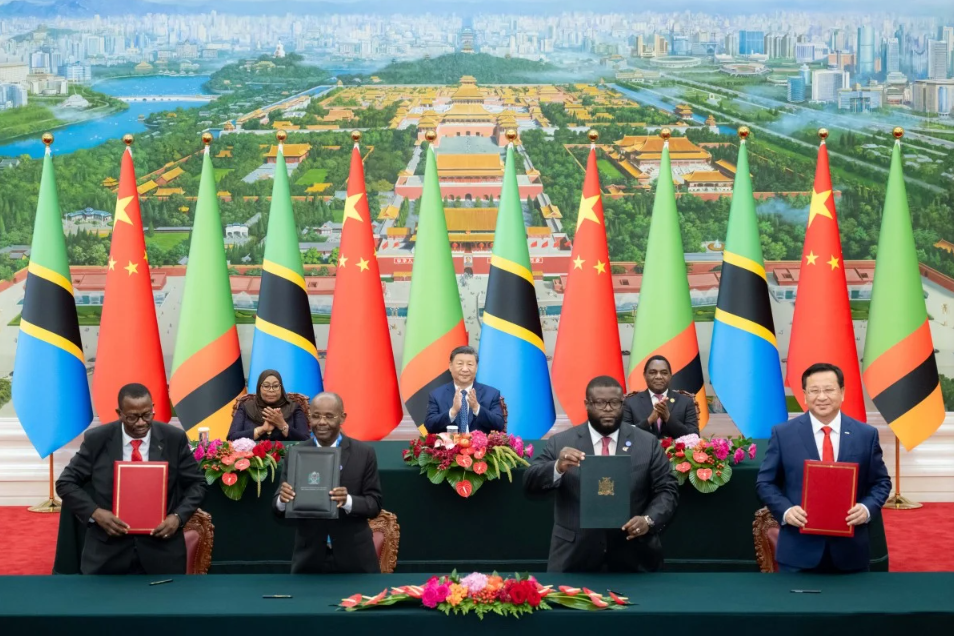Lucio Blanco Pitlo III, President of Philippine Association for Chinese Studies, and Research Fellow at Asia-Pacific Pathways to Progress Foundation
Dec 13, 2024
ASEAN and BRICS are both international cooperative organizations, much like the G7 - except both are led by non-Western aligned nations. The addition of Indonesia, Malaysia, Thailand and Vietnam to BRICS raises the question of whether these groups can harmonize their goals without disrupting ASEAN's long-standing geopolitical orientation.

Sebastian Contin Trillo-Figueroa, Geopolitics Analyst in EU-Asia Relations and AsiaGlobal Fellow, The University of Hong Kong
Mohamed Ibrahim Hafez, Researcher, Political Economy of MENA, Nottingham Trent University
Dec 13, 2024
Africa’s growing affinity for China draws both excitement and concern from observers the world over, while African leaders themselves seem drawn to the material benefits China is offering. What has China really done for Africa’s developing nations thus far?

Richard Javad Heydarian, Professorial Chairholder in Geopolitics, Polytechnic University of the Philippines
Dec 13, 2024
The West’s dominating influence around the world has come under heavy scrutiny as open conflicts rage on in Europe and the Middle East. Does this year’s BRICS Summit, hosted in Russia, represent an inflection point in the global community’s tolerance for U.S.-led order?

Zhu Junwei, Director, Center for American Studies, Grandview Institution
Dec 13, 2024
To avoid misunderstandings that could escalate into conflict, China and the United States must come to agreement about what strategic stability means. The concept is interwoven with the basic assumptions of each side as they negotiate, but their current mismatch is serious and undermines success.
Mohamed ElBaradei, Director General Emeritus, International Atomic Energy Agency; Nobel Peace Prize Winner
Dec 03, 2024
At 82, I have lived through countless political and social upheavals, enough to become somewhat inured to history’s recurring cycles. But recent developments have left me profoundly shaken and afraid. The bedrock principles of international law, established in the aftermath of World War II, are being flagrantly undermined. The ban on acquiring territory by force, the obligation to protect civilians during conflict, the limitations on the right of self-defense, and the United Nations Security Council’s mandate to “maintain international peace and security” are all unraveling, with little regard for the consequences.
Ghulam Ali, PhD, Monash University, Australia
Dec 03, 2024
The unity of the Gulf states, their diversified partnerships and their degree of assertiveness — along with China’s deepened relationships in the region — may constrain U.S. dominance. Even so, China must devise policies to navigate the unexpected strategic challenges it might encounter.
Tian Shichen, Founder & President, Global Governance Institution
Anthony Moretti, Distinguished Research Fellow at Global Governance Institution, Associate Professor at Robert Morris University
Dec 03, 2024
A fundamental shift in how the international community approaches global governance is required. Through concerted action, nations can resist the pull of unilateralism and build a more inclusive and stable international order.
Brian Wong, Assistant Professor in Philosophy and Fellow at Centre on Contemporary China and the World, HKU and Rhodes Scholar
Nov 29, 2024
The incoming Labour government in the UK is pursuing a pragmatic re-engagement with China, driven by economic challenges and a desire to stabilize trade and diplomatic relations, as seen in recent high-level dialogues. While a full reset to the "Golden Era" of ties is unlikely due to geopolitical constraints and domestic skepticism, opportunities for collaboration remain in areas like climate change and education, fostering mutual understanding and progress.
Brian Wong, Assistant Professor in Philosophy and Fellow at Centre on Contemporary China and the World, HKU and Rhodes Scholar
Nov 29, 2024
The Trump administration’s blame-driven approach to U.S.-China relations fueled mutual losses and entrenched scapegoating of China for U.S. domestic issues. Ultimately, subnational diplomacy and pragmatic collaboration are essential for rebuilding constructive ties.
Xiao Bin, Deputy Secretary-general, Center for Shanghai Cooperation Organization Studies, Chinese Association of Social Sciences
Nov 29, 2024
The recent election in the United States has given Russia an opportunity to restart strategic dialogues. Under Donald Trump’s leadership, however, U.S.-Russia relations are likely to be dominated by containment and counter-containment. Meanwhile, Russia believes that Russia-China relations are central to world security and can counter Trump’s inclination to make peace through force.
Back to Top

- China-US Focus builds trust and understanding between the U.S. and China through open dialogue among thought leaders.
- Our Offerings
- Topics
- Videos
- Podcasts
- Columnists
- Research Reports
- Focus Digest
- Stay Connected
-
Thanks for signing up!
- Get the latest stories from China-US Focus weekly.